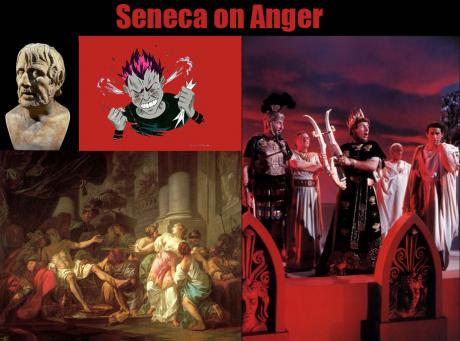
Alain de Botton makes Philosophy easy to understand. Here he speaks about Roman Philosopher Lucius Annaeus Seneca on his views on Anger. Seneca was a tutor and later advisor to emperor Nero, who according to history was responsible for the burning of Rome in a feat of Megalomania and anger.
Seneca on Anger – A Guide To Happiness with Alain de Botton (BBC):
Part I:
Part II:
Part III:
Trailer to Quo Vadis (1951) starring Peter Ustinov, Deborah Kerr, Robert Taylor:
Nero ( Peter Ustinov) Sings to everyone’s boredom but himself:
Roman Senator Petronius Commits Suicide after denouncing Nero’s Tyranny which triggers the Emperor’s wrath:
Early Christians fed to the Lions by Nero:
Emperor Nero blamed the Christians for a fire in Rome which was started by himself. He then arrested the Christians and fed them to the lions.
Lucius Annaeus Seneca (often known simply as Seneca, or Seneca the Younger) (c. 4 BC – AD 65) was a Roman Stoic philosopher, statesman, dramatist, and in one work humorist, of the Silver Age of Latin literature. He was tutor and later advisor to emperor Nero. He was later forced to commit suicide for complicity in the Pisonian conspiracy to assassinate this last of the Julio-Claudian emperors; however, he may have been innocent.His father was Seneca the Elder.
Works attributed to Seneca include a dozen philosophical essays, one hundred twenty-four letters dealing with moral issues, nine tragedies, a satire, and a meteorological essay. One of the tragedies attributed to him, Octavia, has been argued as having been written by another. His authorship of another, Hercules on Oeta, has been questioned, though not to the extent of the Octavia..
Seneca generally employed a pointed rhetorical style. His writings contain the traditional themes of Stoic philosophy: the universe is governed for the best by a rational providence; contentedness is achieved by a simple, unperturbed life in accordance with nature and the duty to the state; human suffering should be accepted and has a positive effect on the soul; study and learning is important; et cetera. He emphasized practical steps by which the reader might confront life’s problems. In particular, he considered it important to confront the fact of one’s own mortality. The discussion of how to approach death dominates many of his letters.
More About Seneca Here
Related Blogs:
HISTORY OF IDEAS: Jean Paul Sartre on Freedom and Existentialism (BBC)
HISTORY OF IDEAS: Montaigne’s Guide To Happiness,Wisdom and Self-Esteem (BBC Documentary)
HISTORY OF IDEAS:Socrates on Self-Confidence and Non Conformist Thought (BBC Documentary)
HISTORY FORUM: The Age of Enlightment in France and Europe.
EMPIRE OF THE MIND: The Greeks – Crucible of Civilization narrated by Liam Neeson (PBS-1999)
HISTORY FORUM: Machiavelli’s “The Prince” and the “Art” of Governing
GOOD READ: All You Need to Know About The Enlightment Philosophers
HISTORY FORUM: Nader Naderpour on Iran’s Constitutional Revolution and European Rennaissance (1996)






